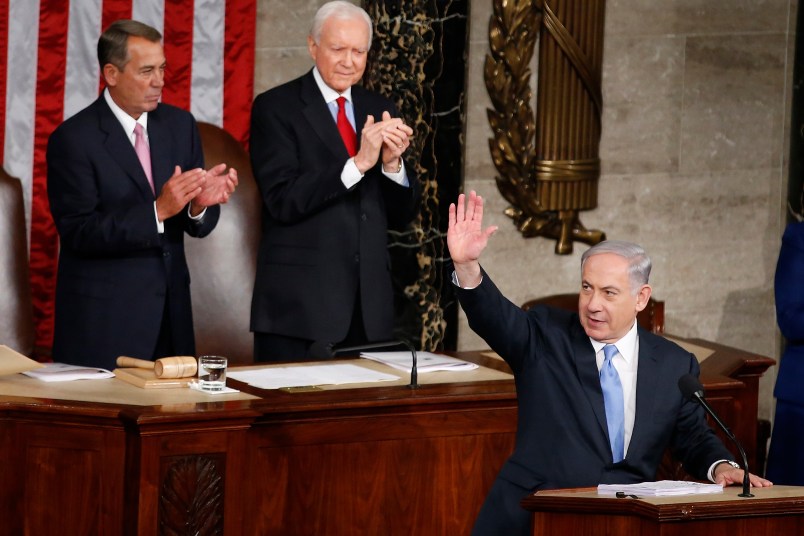Livni: “The ties between capital, government and [gambling] chips are destroying our vital relationship with the United States and undermining Israel’s security. Netanyahu and Adelson conceal the amount of money spent on Israel Hayom’s election propaganda. Adelson is a casino magnate who, with his billions, controls the Republicans in the United States, and here, he controls Netanyahu. And as in a puppet show, he pulls the political strings both there and here.”
Tzipi Livni is the number two candidate on the ‘Zionist Camp’ ticket. In effect she is running as a joint ticket with the Labor Party, headed by Yitzhak Herzog.
After yesterday’s speech by Israeli Prime Minister Netanyahu, establishment Washington was positively gaga for Netanyahu, his speech and what many were suspecting was its game-changing nature. Personally, I hope this is not the case. From a dispassionate view, I’m skeptical, in part because official Washington tends to get these things wrong. The more immediate question however is how it plays in Israel. That is where the story could be confirmed or dramatically changed in only a few weeks.
I’ve been meaning for a while to update you on the progress of the election and what the polls are showing.
The gist is that the Zionist Camp/Labor started out with a thin lead and saw it drift away through some mix of an anemic campaign and hostilities to the north. Then in mid-February, the numbers started to move back in Labor’s direction.
It is very important to note that the differences here are very small. The aggregate of polls results have either seldom or never shown either Likud or Labor more than two Knesset seats ahead of the other. And they’ve been clustered in the low-mid-20s. Israeli election polls are especially volatile because you have an electoral threshold of four seats (higher in this election than it used to be). That means that one party can be holding four seats or and suddenly slip under and have none.
With all this said, the latest poll of polls shows Netanyahu’s Likud party falling over the last couple weeks. Notably, it’s Likud falling more than Labor rising. And the shift seems largely to be Likud shedding votes to the harder right Jewish Home party of Naftali Bennett – something that Herzog’s party has more or less being trying to encourage, so as to weaken Netanyahu and undermine his shot at getting the first opportunity to form a government.
The key question is what polls will show after the speech. Polls from Tuesday show Netanyahu’s Likud 2 or 3 seats behind Labor. So that’s the starting point against which to measure the speech. Initial reactions have been considerably more tepid than elite media reaction in the United States.
A few points to consider.
First, whoever gets the most seats in the election seems almost a secondary point. Absent some dramatic development, most of the movement in the polls has left the basic balance between left, right and center basically intact. And in part for reasons I’d discussed here, it’s easier to put together a right-wing coalition than a center-left one. But it’s possible to do both. What it really comes down to is the position of center and center-right parties and also religious parties which would normally be more natural partners with Likud but are each disaffected from Netanyahu.
Netanyahu has generally been running a campaign to drive up votes from his base rather than try to pull votes from the center. It’s possible that the Knesset seat take from the right could hold steady and yet Netanyahu could drive up his own count by pulling support from the Jewish Home party to his right, since the speech is the kind of red meat that appeals to those voters.
Second, a player in the Israeli campaign world pointed out to me last week that virtually every Israeli election ends up having one party dramatically over-perform. Obviously which party that might be could make a huge difference.
That said, for all these reasons, coalitional politics is probably a bigger deal than electoral politics for this election. Because we probably know roughly the distribution of seats – there’s more uncertainty about the relationships between the parties and even more their leaders.






